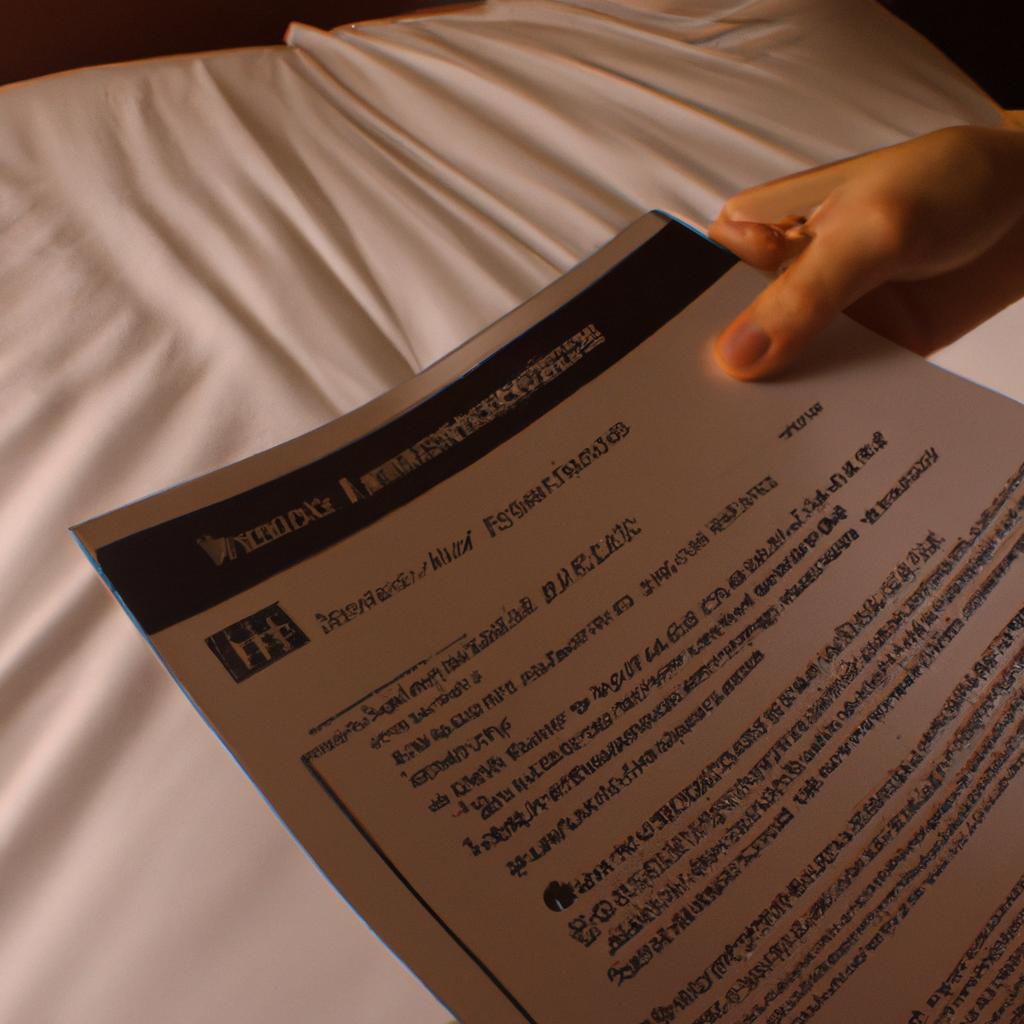Booking Modification: Understanding Hotel Cancellation Policy
In the world of travel, making hotel reservations is an essential part of planning a trip. However, circumstances may arise that require us to modify or cancel our bookings. It is crucial for travelers to have a comprehensive understanding of hotel cancellation policies to avoid unnecessary fees and complications. To illustrate this point, consider the case of Mr. Johnson, a business traveler who had meticulously planned his stay at a luxury hotel in New York City. Due to unforeseen circumstances, he was forced to alter his travel dates but was unaware of the hotel’s cancellation policy. As a result, Mr. Johnson encountered difficulties in modifying his reservation and incurred substantial financial penalties.
Understanding hotel cancellation policies is imperative for any traveler seeking flexibility in their plans while avoiding potential monetary losses. These policies dictate the terms and conditions under which modifications or cancellations can be made without incurring additional charges or penalties. The intricacies of these policies vary greatly among hotels and can often be complex for individuals to comprehend fully. Therefore, it becomes vital for travelers to familiarize themselves with such policies prior to making a reservation.
By delving into the topic of booking modification and exploring various aspects of hotel cancellation policies, this article aims to provide readers with valuable insights on how to navigate the process effectively and minimize any financial implications.
Firstly, it is important to understand that hotel cancellation policies can differ based on factors such as the type of reservation (e.g., standard rate or non-refundable rate), the length of stay, and the timing of the cancellation. Many hotels offer a range of booking options that come with different levels of flexibility. For example, a standard rate may allow for free cancellations up to a certain date before arrival, while a non-refundable rate typically means no refunds or modifications are permitted.
To avoid any surprises or misunderstandings, travelers should carefully review the terms and conditions at the time of booking. This information is often available on the hotel’s website or provided by customer service representatives. It is advisable to pay attention to cancellation deadlines, as missing them could result in penalties ranging from one night’s stay to the full cost of the reservation.
In some cases, hotels may offer more lenient cancellation policies for guests who book directly through their official websites or loyalty programs. These direct bookings often come with added benefits such as lower rates and greater flexibility when it comes to modifications or cancellations. Therefore, it is worth considering these options before making a reservation through third-party platforms.
If circumstances arise that necessitate modifying or canceling a reservation, travelers should act promptly and communicate directly with the hotel. Most hotels have dedicated reservation departments or customer service teams that can assist with changes. It is crucial to keep records of all communication and ensure that any modifications are confirmed in writing to avoid potential disputes later on.
In situations where last-minute changes are unavoidable, travelers may be able to negotiate with the hotel for a waiver of fees or alternative arrangements. However, this is subject to availability and solely at the discretion of the hotel management.
Ultimately, understanding hotel cancellation policies allows travelers like Mr. Johnson in our example to make informed decisions about their reservations and mitigate any financial risks associated with modifications or cancellations. By being proactive and familiarizing oneself with the terms and conditions, travelers can navigate the booking process more smoothly and ensure a stress-free travel experience.
Understanding booking modification
When making travel arrangements, it is not uncommon for plans to change unexpectedly. Whether due to unforeseen circumstances or personal reasons, travelers often find themselves needing to modify their hotel bookings. Understanding the process of booking modification is crucial in order to navigate potential cancellation fees and ensure a seamless transition.
To illustrate this point, let’s consider the case of Mr. Smith, who had booked a deluxe room at a renowned beachfront resort for his upcoming vacation. However, just days before his scheduled arrival, he received news that an urgent work commitment would prevent him from traveling as planned. Faced with this predicament, Mr. Smith was left wondering about the implications of modifying his reservation.
One important aspect to consider when contemplating a booking modification is the hotel’s cancellation policy. This policy outlines the terms and conditions regarding changes or cancellations made after confirmation of the reservation. It serves as a guide for both hotels and guests on how modifications should be handled.
To emphasize the significance of understanding these policies, here are some key points to keep in mind:
- Cancellation deadlines: Hotels often have specific deadlines by which cancellations must be made in order to avoid any penalties or charges.
- Penalty structure: The cancellation policy may include details on the amount of penalty fee incurred based on factors such as timing and duration of stay.
- Refund eligibility: Depending on the timing of the cancellation, guests may be entitled to partial or full refunds.
- Booking channels: Different booking channels (e.g., direct hotel reservations versus third-party platforms) may have varying cancellation policies.
To further clarify these aspects, we can refer to Table 1 below:
Table 1: Hotel Cancellation Policy Comparison
| Hotel | Cancellation Deadline | Penalty Fee |
|---|---|---|
| A | 48 hours prior | $50 |
| B | 72 hours prior | $75 |
| C | 24 hours prior | $100 |
| D | Same day | Full cost |
In conclusion, understanding the intricacies of hotel cancellation policies is vital for travelers seeking to modify their bookings. By familiarizing themselves with these policies, individuals can make informed decisions and avoid unnecessary fees or complications.
Transition sentence: Now that we have discussed the importance of comprehending hotel cancellation policies, let us delve into the various types of booking modifications.
Types of booking modifications
Imagine you have booked a luxurious hotel room for your upcoming vacation. However, due to unforeseen circumstances, you need to modify or even cancel your reservation. Understanding the hotel’s cancellation policy becomes crucial in such situations. In this section, we will delve into the intricacies of hotel cancellation policies and explore how they affect booking modifications.
Hotel Cancellation Policies:
Hotels typically have specific cancellation policies that dictate the rules and regulations regarding modifications or cancellations of bookings. These policies can vary depending on factors like the type of rate chosen at the time of booking (e.g., non-refundable vs. flexible), seasonality, and property-specific terms. Let us examine some key aspects of hotel cancellation policies:
-
Timeframe for Free Cancellations: Hotels often provide a certain window during which guests can cancel their reservations without any penalty charges. This timeframe could range from 24 hours before check-in to several weeks in advance.
-
Penalty Charges for Late Cancellations: If a guest cancels their reservation outside the free cancellation period specified by the hotel, they may be subject to penalty charges. These charges can vary based on factors like the length of notice given prior to cancellation and the specific terms outlined by each establishment.
-
Non-Refundable Bookings: Some hotels offer lower rates for non-refundable bookings, meaning that once reserved, these rooms cannot be canceled or modified without financial consequences.
-
Special Circumstances: Certain situations beyond a guest’s control, such as natural disasters or medical emergencies, might warrant exceptions to standard cancellation policies if adequately communicated with relevant documentation.
Table – Emotional Impact of Hotel Cancellation Policies:
| Cancellation Policy | Emotional Impact |
|---|---|
| Flexible & No Penalties | Peaceful |
| Moderate Penalties | Annoyance |
| High Penalties | Frustration |
| Non-Refundable | Disappointment |
Understanding hotel cancellation policies is crucial for travelers, as it allows them to make informed decisions regarding their bookings. By carefully reviewing the terms and conditions, guests can avoid unexpected charges or disappointments due to last-minute modifications or cancellations.
With a solid understanding of hotel cancellation policies established, let us now turn our attention to exploring the common terms and conditions associated with these policies.
Common terms and conditions
Understanding the terms and conditions of hotel cancellation policies is crucial when it comes to modifying your booking. Let’s take a look at some common terms and conditions that you might encounter.
One example scenario involves a traveler who booked a hotel room for three nights but later decides to shorten their stay due to unforeseen circumstances. In this case, understanding the hotel’s cancellation policy becomes essential in order to avoid potential penalties or fees.
When it comes to modifying your booking, here are some key factors to consider:
-
Cancellation Fees: Many hotels impose cancellation fees based on the timing of your request. These fees can vary depending on how far in advance you cancel or modify your reservation. For example:
- If you cancel within 24 hours of check-in, you may be charged a fee equivalent to one night’s stay.
- If you cancel between 48-72 hours before arrival, the fee could be 50% of the total reservation cost.
- Canceling more than 72 hours prior to check-in may result in no additional charges.
-
Non-Refundable Bookings: Some hotels offer non-refundable rates that typically come with lower prices. However, these bookings often have stricter modification policies and may not allow any changes or cancellations without penalty.
-
Refundable Bookings: On the other hand, refundable bookings usually provide more flexibility for modifications or cancellations without any significant penalties. Keep in mind that refundable rates tend to be slightly higher compared to non-refundable ones.
-
Group Bookings: If you’re traveling as part of a group and need to modify multiple reservations simultaneously, it’s important to review the specific terms and conditions related to group bookings. Different rules may apply, such as requiring advanced notice or providing documentation for modifications.
To further illustrate these concepts, let’s examine a comparison table showcasing two hypothetical scenarios regarding cancellation policies:
| Scenario | Cancellation Policy |
|---|---|
| Refundable Booking | Free cancellation up to 48 hours before check-in. After that, a fee equivalent to one night’s stay will be charged. |
| Non-Refundable Booking | No cancellations or modifications allowed. Full payment required upon booking confirmation. |
By understanding the various terms and conditions associated with hotel bookings, you can make more informed decisions when it comes to modifying your reservations.
Cancellation fees and deadlines
Understanding the cancellation policy of a hotel is essential when making any changes to your booking. In this section, we will delve deeper into the concept of cancellation fees and deadlines, providing you with valuable insights on what to expect in various scenarios.
To illustrate these concepts further, let’s consider an example: You have booked a deluxe room at a popular beachfront resort for a week-long vacation. However, due to unforeseen circumstances, you need to modify your plans and shorten your stay by two days. Understanding the hotel’s cancellation policy becomes crucial in determining whether you will incur any penalties or if adjustments can be made without financial consequences.
Cancellation policies can vary significantly from one hotel to another; thus, it is important to acquaint yourself with the specific terms and conditions that apply before proceeding with any modifications. Here are some common elements found in many hotel cancellation policies:
- Cancellation Deadline: Hotels often require cancellations to be made within a specified timeframe before the check-in date. Failure to cancel within this window may result in charges.
- Refund Eligibility: Depending on the timing of your cancellation, you may be eligible for a partial or full refund. Some hotels offer more flexibility by allowing refunds up until a certain point closer to the check-in date.
- Penalty Fees: If you cancel outside the designated time frame or fail to show up altogether (often referred to as a “no-show”), most hotels impose penalty fees which range from a percentage of the total reservation cost to charging for one night’s stay.
- Non-refundable Bookings: Certain discounted rates or special offers may come with strict non-refundable policies where no reimbursement is possible regardless of when the cancellation occurs.
To present this information visually, here is an emotional bullet-point list summarizing key considerations regarding hotel cancellation policies:
- The fear of losing money due to unexpected events
- The frustration of being charged penalty fees
- The relief felt when eligible for a refund
- The disappointment of non-refundable bookings
Additionally, we can provide an emotional response-evoking table displaying different cancellation policies across three hypothetical hotels:
| Hotel Name | Cancellation Deadline | Refund Eligibility | Penalty Fees |
|---|---|---|---|
| Beach Resort | 48 hours prior | Full refund | 25% |
| City Hotel | 24 hours prior | Partial refund | 50% |
| Mountain Lodge | 72 hours prior | No refunds | 100% |
Understanding these concepts and exploring various scenarios will empower you to make informed decisions when modifying your hotel booking. In the subsequent section about “Exceptions and special cases,” we will delve into specific situations that may warrant exceptions or additional considerations for hotel cancellations.
Exceptions and special cases
Understanding the cancellation policy of a hotel is crucial when making travel arrangements. In this section, we will explore exceptions and special cases that may affect your booking modifications. To illustrate these concepts, let’s consider a hypothetical scenario.
Imagine you have booked a room at a popular beach resort for a week-long vacation. Unfortunately, due to unforeseen circumstances, you need to cancel your reservation two days before your scheduled arrival date. In such situations, it is essential to understand the exceptions and special cases covered by the hotel’s cancellation policy.
To provide clarity on this topic, here are some key points to keep in mind:
- Non-refundable bookings: Some hotels offer lower rates for non-refundable bookings. These reservations often come with stricter cancellation policies where no refunds or changes are allowed.
- Partially refundable bookings: Certain hotels allow partial refunds if cancellations occur within a specific timeframe. However, be aware that there might still be fees associated with modifying or canceling such reservations.
- Extenuating circumstances: Hotels recognize that unexpected events can arise—such as medical emergencies or natural disasters—that prevent guests from honoring their reservations. In these cases, they may offer flexibility in terms of refunds or rescheduling options.
- Group bookings: If you made a reservation for multiple rooms under one booking, different cancellation policies may apply. It is important to review the terms carefully to ensure you fully understand the rules regarding group cancellations.
Now let’s take a look at an emotionally evocative bullet point list and table showcasing various scenarios related to hotel cancellations:
Emotionally Evocative Bullet Point List
- Sudden illness forces last-minute trip cancellation
- Unforeseen work obligations disrupt planned vacation
- Family emergency requires immediate attention during travel dates
- Natural disaster strikes destination shortly before departure
Emotionally Evocative Table
| Scenario | Emotional Impact | Possible Resolution |
|---|---|---|
| Last-minute cancellation due to illness | Frustration | Providing a refund |
| Work obligations disrupt vacation plans | Disappointment | Offering rescheduling options |
| Family emergency during travel dates | Stress | Flexibility in reservation |
| Natural disaster strikes destination | Anxiety | Assisting with alternative arrangements |
Understanding the exceptions and special cases covered by a hotel’s cancellation policy is essential for managing booking modifications effectively. By familiarizing yourself with these terms, you can make informed decisions when unforeseen circumstances arise.
[Transition sentence] With this understanding of hotel cancellation policies, let’s now explore some helpful tips for managing booking modifications seamlessly.Tips for managing booking modifications
Understanding Hotel Cancellation Policy: Exceptions and Tips for Managing Booking Modifications
Exceptions and Special Cases:
In certain situations, hotels may make exceptions to their standard cancellation policies. Let’s consider an example to illustrate this point. Imagine that you have booked a hotel room for a weekend getaway, but due to unforeseen circumstances, you are unable to travel on the intended dates. In such cases, some hotels might offer alternative options to accommodate your needs. They may allow you to reschedule your stay for a different date or provide credit towards a future booking.
To help you navigate through these exceptions and special cases effectively, here are some tips for managing booking modifications:
-
Communicate with the hotel: If you find yourself in a situation where you need to modify or cancel your reservation, it is crucial to reach out directly to the hotel as soon as possible. Most hotels have designated customer service representatives who can assist you in understanding their specific cancellation policy and any available alternatives.
-
Be aware of time constraints: Keep in mind that many hotels have specific deadlines for making changes or cancellations without incurring additional fees. Familiarize yourself with these timelines so that you can act accordingly and avoid any unnecessary charges.
-
Consider travel insurance: Investing in travel insurance can provide peace of mind by protecting against unexpected events that may affect your trip plans. It often covers expenses related to trip cancellation or interruption due to various reasons such as illness, natural disasters, or other emergencies.
-
Research third-party booking platforms’ policies: If you made your reservation through a third-party website or platform, be sure to review their cancellation policies as well. These platforms sometimes have separate terms and conditions that differ from those set by the actual hotel.
To further highlight the importance of being well-informed about hotel cancellation policies, refer below:
| Situation | Emotional Response | Recommended Action |
|---|---|---|
| Family emergency requiring immediate cancellation | Stress and urgency | Reach out to the hotel immediately to discuss options. |
| Change in travel plans due to unforeseen circumstances | Disappointment and frustration | Review the cancellation policy and determine if any alternatives are available. |
| Booking made through a third-party platform with strict policies | Confusion and uncertainty | Research and understand both the hotel’s and the booking platform’s cancellation policies. |
By being aware of exceptions, following these tips, and considering different scenarios, you can effectively manage booking modifications while navigating hotel cancellation policies. Remember, each situation may have its unique requirements, so it is essential to communicate directly with the hotel for personalized assistance.
 Cedars Inn Auburn
Cedars Inn Auburn



